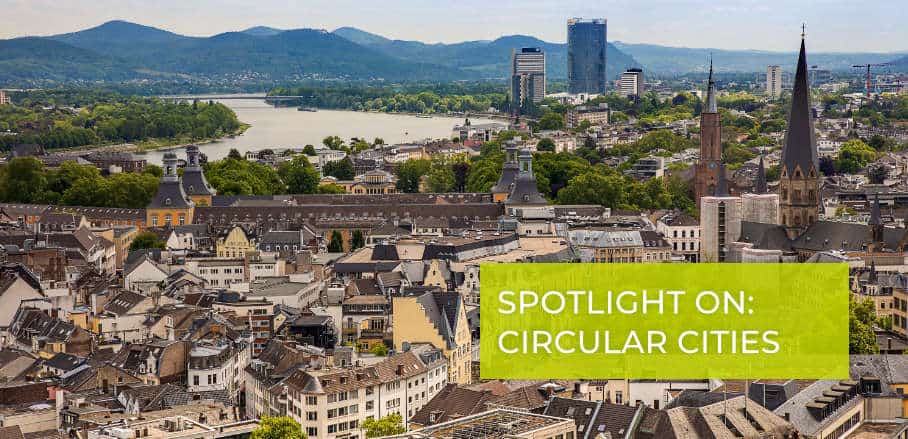Time to be Daring: Circular Cities Tackle the Climate Emergency
In a world beset by multiple crises, mayors are multitaskers, crisis managers and frontline responders – and crises never wait in line. Katja Dörner, Mayor of Bonn and ICLEI Co-Chair for Climate Action on circular cities and Bonn’s promising path to becoming zero-waste.
Climate emergency is not a theory. Coming closer to the limits of our planetary boundaries is neither. Both are a threat to the globe, to you and me, putting the lives of future generations at stake – which is unacceptable to cities and mayors around the globe.
Climate science shows undoubtedly that we must make deep, civilisation-wide changes by 2030 to limit a planetary catastrophe. Global negotiation processes and global climate action must catch up as climate change is picking up speed. Global warming of 1.5 degrees already has severe impacts. With every further degree, more lives will be put at risk. With every delay in action, more costs will be incurred in the long run.
It is surprising, indeed, that, given all this scientific evidence, many national and international leaders are still struggling to address this urgency through swift, decisive action! Securing the future and well-being of our people is the primary mandate of a mayor, and can only happen within the boundaries of our planet. Therefore, I take a stand for climate neutrality in Bonn by 2035 at the latest. This is why, as ICLEI Co-Chair Climate Action, I am advocating for the future of cities and their own contributions towards the global climate debate. And this is precisely the reason why I am co-convening Daring Cities 2021, the Virtual Forum for Urban Leaders to Tackle the Climate Emergency, taking place from 4 to 8 October 2021. After all – mayors must take a lead in the climate movement.
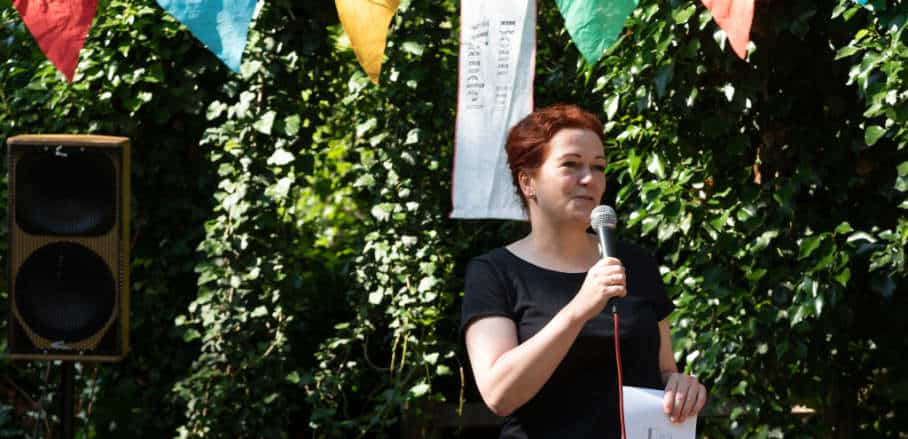
Bonn4Future workshops, summer 2021. Mayor Katja Dörner © Jo Hempel, Bonn im Wandel e.V./flickr (CC BY-NC-SA 4.0)
Let us talk about this leadership in the climate emergency. Us mayors – particularly in the ICLEI-network of more than 2,500 jurisdictions – are set on leading in action. Everywhere in the world, our local action needs to respond to the increasing climate emergency. We demonstrate ambition, driven by our peers and by our accountability to our people.
However, mayors cannot save the world on their own! We call on our national governments, fellow local and regional governments, and broader civil society to join and support us in achieving the level of climate action necessary to truly give us a chance at limiting climate change before it reaches the 1.5. One promising way to achieve this goal is to transition to more circular-based economies.
Circular Development Is Vital for Successful Climate Action
A recent study by the C40-network flagged that local consumption causes emissions linked to local production and a similar amount far beyond our city borders. We need to tackle these emissions from unsustainable production and consumption systems relying on intense resource extraction or polluting manufacturing processes – and the rising waste quantities at the end of the pipe. If we only base our climate plans on direct emissions, indirect emissions will become the blind spot of our mitigation efforts. To bring about real change, we must dare cut across sectors, hierarchies, and jurisdiction boundaries.
ICLEI has defined circular development as one of five strategic pathways towards sustainable urban development, along with low emission, resilient, nature-based and equitable/people-centred development. Circular urban development aims at closing material loops and maximising the value and utility of resources by five steps: Rethinking, Regenerating, Reducing, Reusing and Recovering.
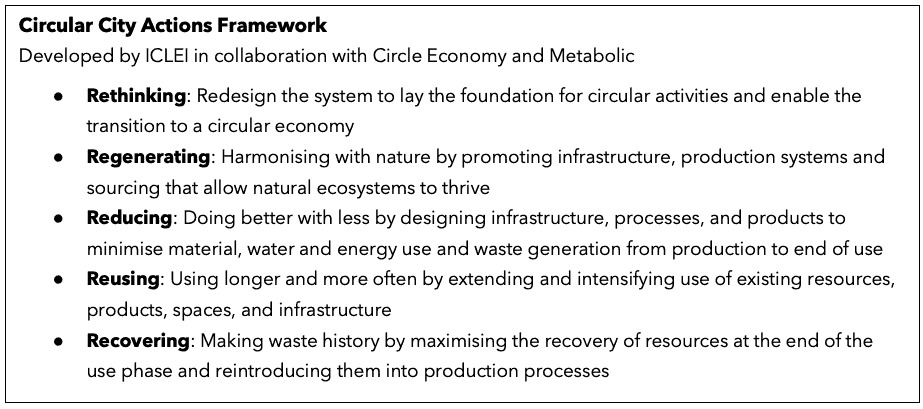
Through circular development, we strive to keep our societies within planetary boundaries while meeting people’s needs. Also, a truly circular economy supports equitable access to resources and services and strengthens local and productive economies that encourage job creation.
To support the transition away from the linear economy on the local level, all production, consumption, and waste management processes influenced by the city, local businesses or residents should be addressed. In Bonn, for example, we have started working on applying the circular development lens to food systems.
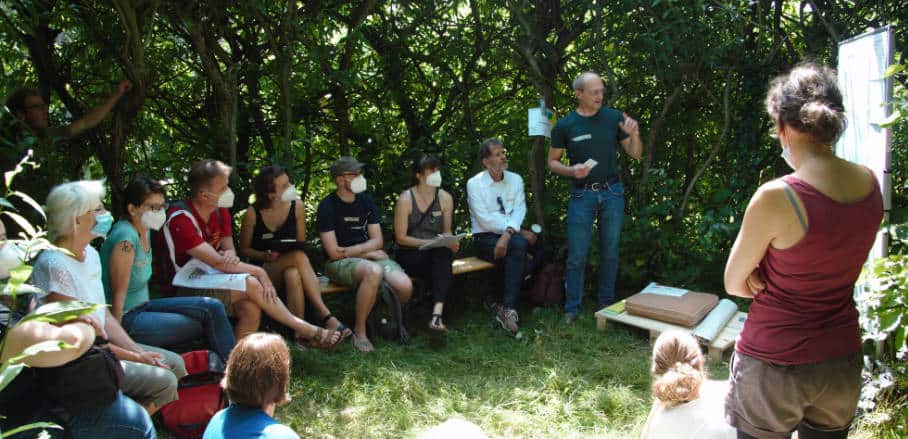
Bonn4Future workshops, summer 2021 © Robert Janssen, Bonn im Wandel e.V./flickr (CC BY-NC-SA 4.0)
Supporting Circular Food Systems in Bonn
The Bonn region with its fertile soils has been used for agriculture for thousands of years. But the past 100 years saw land specialisation in single crops and an overall decline in the number of farms – and food-related activities trigger massive emissions all along the value chain.
Bonn has taken steps to reduce the climate impacts of its food system by joining the network of Organic Cities (Bio-Städte) in 2019. The city is also rich in community initiatives that support circularity in food systems from farm to fork. In a research project, we partnered with ICLEI and the SUN Institute Environment & Sustainability to look at new ways for meeting people’s needs while lowering emissions, pollution, and resource use. The publication “Towards Circular Food Systems in Bonn” identifies gaps and opportunities for action to support circular food systems based on best practices around the globe. It also explores how circular food systems could contribute to Bonn’s strategic goals including zero waste, the localisation of the SDGs, public participation, and climate action. Yes, local and circular food systems have every potential to reduce emissions by tackling the embedded carbon from farm to fork.
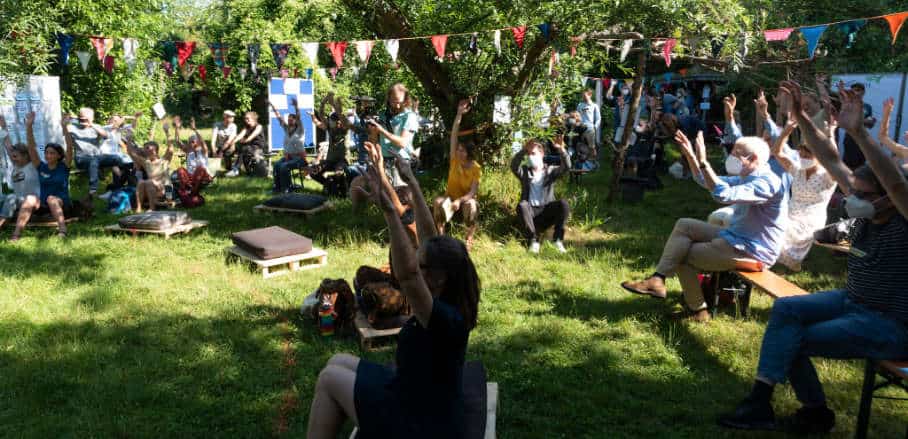
Bonn4Future workshops, summer 2021 © Jo Hempel, Bonn im Wandel e.V./flickr (CC BY-NC-SA 4.0)
The Many Co-Benefits of Circular Food Systems
Food is an ideal entry point to sustainability. People and communities increasingly feel the need to be connected to the food they consume. They choose to consciously source local food, to engage in small-scale food production on their balconies or in their gardens. And new initiatives have evolved from this – community gardens, solidarity agriculture, food sharing.
No wonder circular food systems are addressed in our civil-society driven process „Bonn 4 Future – Wir fürs Klima“ towards climate neutrality, led by the Transition Town Initiative “Bonn im Wandel”. This local hub for sustainability and transformation has a strong focus on food systems transformation and is connected with many community initiatives contributing to circular systems. Once these are in place, our long-term goal is to become a zero-waste municipality; largely zero waste residual waste, but also food waste, with a focus on packaging reduction and support of sustainable consumption.
Overall, a circular approach to food systems is valuable beyond climate action, contributing to several SDGs at a time. Bonn is part of the OECD project „Localising the SDGs“ and we will soon complete our second voluntary local review. Therefore, it is important for us to identify indicators linking to these SDGs.
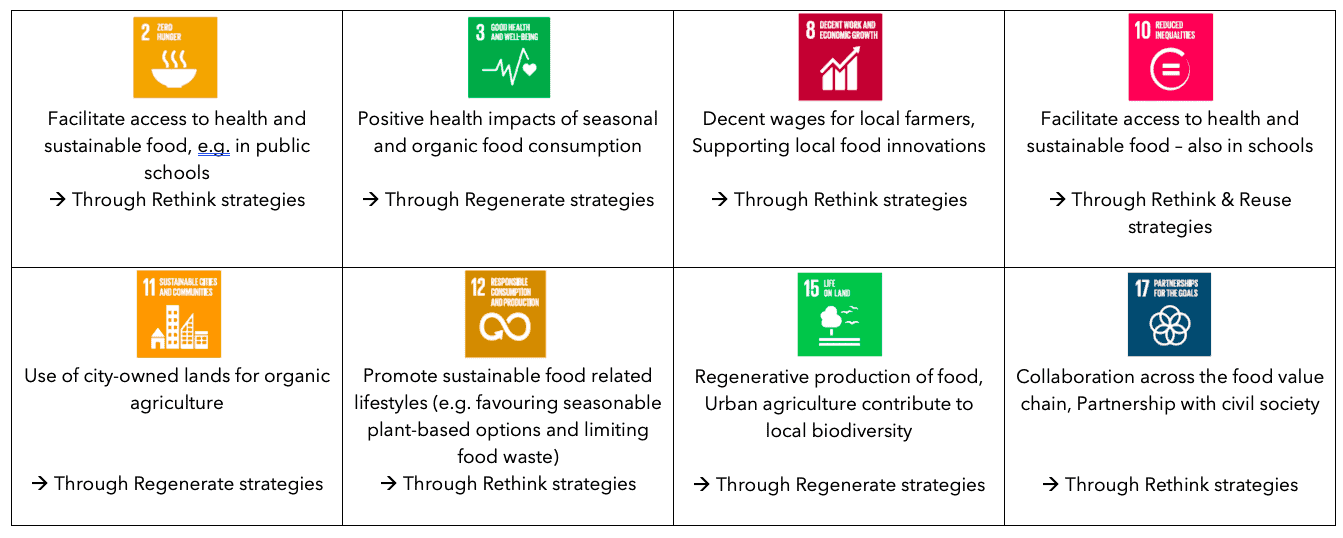
These links speak for themselves. When addressing food systems, we address eight SDGs at a time. And this is how we want to and need to proceed in a time that is characterised by multiple emergencies. It is time to be daring – to take one action and tackle several needs. Time to let the needs of our people and the boundaries of our planet guide our actions. And time to collect the many co-benefits along the way!
- Time to be Daring: Circular Cities Tackle the Climate Emergency - 4. October 2021
